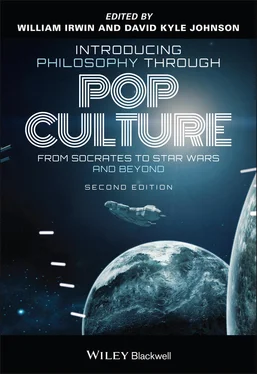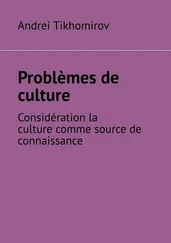In his essay “The Ethics of Belief,” William Kingdom Clifford (1845–1879), an English mathematician and philosopher, explained the potential harm of believing just anything. “Every time we let ourselves believe for unworthy reasons, we weaken our powers of self‐control, of doubting, of judicially and fairly weighing evidence,” he wrote, concluding that it's “wrong always, everywhere, and for anyone, to believe anything upon insufficient evidence.” 1
Amid the exaggerated craziness and illogic of the citizens of South Park, we're sometimes treated to flashes of insight and well‐thought‐out ideas that surprise us. Stan shows off his critical thinking skills as he takes on TV psychics, various cults, and unsupported religious beliefs in a way that would've made Clifford proud. In this chapter, we'll examine how Stan exposes the frauds and the harm they bring to people, while defending scientific thinking and a healthy skepticism.
We acquire our beliefs in various ways. Some come from observation of the physical world, and this is usually our best evidence. The kids believe that Mr. Hankey exists because they see him, but what we see isn't always trustworthy. Cartman, after all, sees pink Christina Aguilera creatures floating around, but they aren't real. Often, our beliefs come on the authority or the testimony of others. The parents believe the children have ADD because that's the conclusion reached by school psychologists. Such a belief may sometimes be a reliable one, but not when it comes from the South Park testers, who are fools. Further, we must be careful when relying on authority figures. Maybe Scientologists believe that there were once frozen alien bodies put in the volcanoes in Hawaii because their leaders say so. But this is nonsense that should be rejected by any sane person.
We see, then, that rational belief requires evidence. The more outrageous the belief, the more evidence is required. As Stan told the Mormon family in “All About Mormons,” “If you're going to say things that have been proven wrong, like the first man and woman lived in Missouri and Native Americans came from Jerusalem, then you better have something to back it up!” Stan is pointing out here that Mormon beliefs should be rejected unless they can be defended, since they're implausible in the face of accepted facts. The Mormons have the burden of proof , that is, the obligation is on them to provide the evidence to back up their claims.
Sadly, for most of the crazy claims made in South Park , that obligation is never met. But there are exceptions. In “Pandemic” one of the imprisoned members of a Peruvian flute band makes the seemingly preposterous assertion that their music (annoying though it may be) is the only thing keeping away “the furry death.” We later learn that he is correct, as giant guinea pigs wreak havoc in the band's absence. Sometimes what seems absurd can be defended after all! But extraordinary evidence is required. So if you're going to suggest that an alien wizard is causing sexual addiction in some kids (“Sexual Healing”), or that the first pope was really a rabbit (“Fantastic Easter Special”), you'd better have compelling reasons.
Returning to “All About Mormons,” two villagers are talking about Joseph Smith. One of them says, “He claims he spoke with God and Jesus.” The other one asks, “Well how do you know he didn't?” Is this a fair question? Should unproven claims be accepted when it appears that they can't be disproved? No. A request to disprove something isn't a request that needs to be answered. This is because the burden of proof always lies with the person making the additional claim, not with those who doubt its truth. If this were not the case, then we would be required to entertain any belief, no matter how absurd. I can't disprove the existence of alien souls inhabiting our bodies, but that doesn't mean I should consider this Scientological claim to be likely. Or to take another example, when Cartman suggests (“Jewpacabra”) that the Jewpacabra is real and coming for them, the leaders of Sooper Foods reluctantly cancel the Easter egg hunt since they can't prove that no such creature exists. Kyle has it right here, as he tells Cartman, “There's no reference of it anywhere on the known species webpage,” and anyone who says otherwise “is either lying or stupid.” We shouldn't fall into the “disproof” trap. If our beliefs can't be supported, then they should be rejected, or at least put aside until further evidence comes about.
But believing things without sufficient evidence hardly seems like a good way to lead a successful life. It's difficult to understand how making decisions without evaluating the available evidence would work in the long run. Imagine picking a college, a career, a place to live, a mechanic, a doctor, or anything, for that matter, without reasoning and examining the facts involved. Imagine going through your life merely guessing whenever a decision is to be made, or going by how you feel at the moment, or basing decisions on what's said by someone who may not be reliable.
Take as an illustration the time when Kyle became very ill and needed a kidney transplant (“Cherokee Hair Tampons”). Instead, his mother took him to the new “Holistic Healer” in town, Miss Information. At her shop, the townspeople lined up to buy all sorts of useless products. Her employees, introduced as Native Americans, must surely know all about healing! Fortunately for Kyle, these “Native Americans” (who turned out to be Cheech and Chong) were honest enough to convince Mrs. Broflovski that Kyle was really sick and should be taken to a real doctor. Stan, who realized from the start that the “healers” were frauds and their methods unscientific, had been urging this all along. He later tricks Cartman into giving up a kidney, so everything works out well for Kyle in the end. Often though, when we start with beliefs that have been uncritically accepted, the outcome isn't so fortunate. When the South Park version of the company BP (the one who caused the oil spill in the Gulf of Mexico), continued drilling without carefully examining the potential risks, they proceeded to create an even worse disaster by ripping a dimensional hole in space allowing the evil Cthulhu to cause great devastation (“Coon2: Hindsight”).
What's at stake is not just having correct beliefs. As we've seen, having incorrect beliefs can have dire consequences. Notice too, how closely beliefs are tied to action. In “Trapped in The Closet,” Stan tells Tom Cruise that he's not as good of an actor as Leonardo DiCaprio, Gene Hackman, or “the guy who played Napoleon Dynamite.” This causes poor Tom to become depressed, and he locks himself in the closet. Now, why should a famous actor care what a little boy thinks of his acting skills? Well, he would care if he was a Scientologist and believed that that little boy is the reincarnation of Scientology founder L. Ron Hubbard. And Mr. Cruise believes this , because the current Scientology leaders told him. So his illogical actions are motivated by a ridiculous belief that's held, not on the basis of any testable evidence (well, they did test Stan's “body thetans” with their “E‐Meters”—more unsupported nonsense), but solely on the basis of authority. And the “authority” here is hardly reliable or objective; in fact, later Cruise admits to Stan that it's all made up and he's doing it for the money.
Faith, Self‐Interest, and Evidence
Many people say their beliefs – especially their religious beliefs – are based on faith. What does this mean? And is this connection a good idea? First, let's be clear what is meant by faith in this context. Sometimes faith means a kind of confidence. In “Scott Tenorman Must Die” Cartman was confident that his friends would betray him, and they did. This allowed his plan for revenge on Scott to work perfectly. Cartman, we might say, had faith that his plan would work.
Читать дальше












